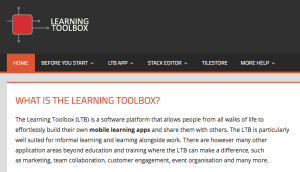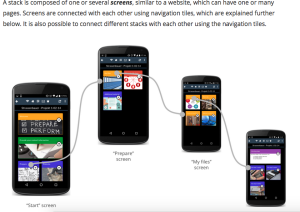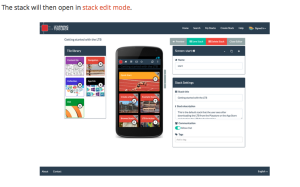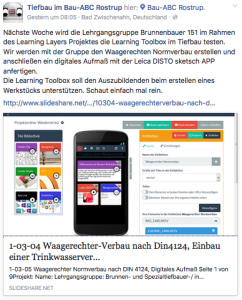In my previous blog on our EU-funded Learning Layers (LL) project I reported on a rapid process of developing stacks in the integrative toolset Learning Toolbox (starting on Wednesday, announced on Friday, to be used on Monday). When writing of this effort of a full-time trainer in the construction sector training centre Bau-ABC, I referred to two parallel processes of preparing stacks – firstly for the theme ‘Health and Safety’ (Arbeitssicherheit und Gesundheitsschutz) and secondly for the transnational mobility scheme Mobipro – EU (and its regional implementation by Bau-ABC). In this blog I will focus on the latter one.
On the transnational mobility scheme Mobipro-EU and how it works
The mobility programme Mobipro-EU is an initiative of the German Ministry of Labour and it is managed by the German Employment Agency (Bundesagentur für Arbeit). Its aim is to support the mobility of interested young people from other EU Member States to Germany to get apprentice training in the dual system of apprenticeship. The scheme provides support for the applicants firstly in their home countries (advice, application & selection procedure and three months’ language training). Secondly, it provides a project organisation that takes care of the training arrangements and accommodation. Altogether, the programme provides the necessary support for foreign apprentices to complete the regular German apprentice training. The programme was started in 2013 and Bau-ABC has become a regional coordination centre for apprentice training in construction sector in 2015.
Here,it is worthwhile to note that this programme differs from the EU-funded mobility schemes that cater for shorter placement periods of individual applicants who complete their education/training programs in their own county. The Mobipro EU supports the placement of groups of apprentices who will stay in Germany during the whole duration of their apprentice training. Thus, the challenges for adjusting oneself to the use of foreign language and getting along in the German society (and its culture of work, education and learning) are much more profound than in the EU-funded exchange measures.
Bau-ABC as a regional coordinator of the implementation of Mobipro-EU
Bau-ABC received its first group of Spanish apprentices (initially 15) in 2015. Some of the apprentices were placed in companies in Bremen and its immediate neighbourhood, others into North-German municipalities near Bau-ABC. In practical terms this meant that the group was divided into two subgroups. The Bremen group had the school part of apprentice training in a vocational school in Bremen, whilst the other group in a vocational school in Rostrup. Bau-ABC provided for both groups the intermediate training (überbteriebliche Ausbildung). Concerning the language learning, the programme envisages that the participants have completed intensive language course and language test (B1) already in their home country. However, upon request of the companies providing the apprenticeships, Bau-ABC has made local arrangements for additional language teaching for both groups, in Bremen and in Rostrup.
Looking back, of the original fifteen ones seven have interrupted their training, whilst the eight are continuing (although two of them are changing from the original occupation to another). Yet, the companies and the Bau-ABC trainers have got a good impression of the motivation and commitment of the remaining apprentices and want to continue the training with larger numbers. Thus, in a short while Bau-ABC and its partner companies are receiving 50 new apprentices from Spain to be trained in construction companies in Bremen and in North-West Germany. Taking into account the progress with Learning Toolbox (LTB) in the intermediate training in Bau-ABC, Melanie Campbell started to develop a stack for the Mobipro-EU scheme to support the training of the present and new Spanish apprentices.
LTB workshop with the Spanish apprentices (10.6.2016)
In the light of the above we seized the opportunity to organise a short LTB-workshop in Bremen on Friday 10th of June. We had originally made the agreement with three apprentices of the Bremen group (Pablo, Sergio and Yadel) but we were happy to get also four others from the regional group (Carlos, Dario, Juan and Joshua). I moderated the workshop together with Melanie.
In the beginning we gave a picture of the Learning Layers (LL) project and on the role of Learning Toolbox (LTB). Then we got the apprentices registered to LTB and looked at some of the stacks that had been prepared to provide information and materials for trade-specific training in Bau-ABC. Then we looked at the prototype stack for Mobipro-EU prepared by Melanie. The participants were invited to reflect on their experiences and think of blocks of themes and related resources to be covered by collection tiles or navigation tiles of the stack.
We had a very lively discussion and I am not in the position to cover it completely. (Melanie made comprehensive notes on flipchart and tried to outline a structure of tiles to be created.) Here I try to give some impressions of topics that came up and tensions to be considered:
- Making the move to Germany: The apprentices were pleased with the thick handbook (full of relevant information) provided by the Spanish consulate. Yet, they appreciated the prospect of having a digital version and shorter information sheets that refer to certain contents of the handbook.
- Making progress with the language skills: The apprentices had completed an intensive course and (most of them) passed the required language test. When coming to Germany they were surprised that their language skills were not always trusted and they were not encouraged to speak German. Also, in their leisure time they had the temptation to seek for Spanish-speaking company. Therefore, they emphasised the need to motivate themselves to to keep speaking German and to try to learn more.
- Getting used to working for construction companies in Germany: Most of the apprentices had attended some kind of school-based vocational education with eventual workplace placement. Yet, the transition to a German apprentice contract (which is essentially an employment contract) provided a major cultural change. Furthermore, the working conditions at construction sites or in project-based work that requires mobility from one site to another, have been new experiences. From the motivational point it would be helpful to prepare the newcomers with advance information.
- Peer learning: Many of the problems and challenges encountered by the apprentices are such that no one has prior information – the members of the pioneering group have had to find their own solutions (or ways to cope). In this respect the blog of Carlos has served a more general purpose – as a forum, on which he has discussed questions of others. In this respect the LTB has a chance to provide a “Questions and Answers” section and a forum for new issues. Also, there are needs to develop peer communication between the Spanish apprentices and their German peers – this should also be explored when developing the stack.
- Recognition of prior learning: One of the shortcomings in the implementation of the Mobipro-EU programme has been the fact that far too little attention has been paid on the recognition of prior competences. Partly this is a matter of insufficient documents or lack of appropriate procedures. Thus, it appears that apprentices may be guided to new occupations (that are alien to them) although they have received a school-based education in another. In some cases it is discovered only in Germany that the apprentices have got vocational education in a (closely) matching occupation and could apply for partial recognition of their prior learning. Here, it is necessary to look at the procedures and to give accurate information on modes of recognition.
– – –
I stop my list here. We discussed these (and other) issues from many perspectives. We came to the conclusion that Learning Toolbox can play a significant role in supporting the newcomer group(s) with their start and with their adjustment to the new circumstances. We were pleased to see that the pioneering apprentices are willing to contribute to the development of LTB stacks and tiles and to share their valuable experiences. I am looking forward to the next steps.
More blogs to come …




